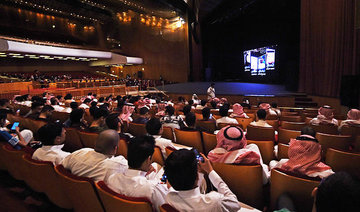JEDDAH: For anyone interested in the art of filmmaking, Saudi star Hajar Al-Naim is a real-life icon who took a risk and smashed expectations.
From a hesitant English speaker to a graduate of Los Angeles’ Loyola Marymount University, Al-Naim’s story is inspirational for Saudi Arabia-based film enthusiasts who wish to explore the industry.
Before she made her dreams come true in Los Angeles, Al-Naim taught as an instructor at King Faisal University after graduating in 2011. She then reached a point where she was bored of her job and realized that her English-language skills were lacking.
“All the English courses I took in Saudi Arabia did not improve my language, so I decided to save some money from my salary because I was working as an instructor in King Faisal University at that time. Then, the hardest part — how would I convince my parents to (let me) go to the US and learn English? We have never traveled outside the Middle East and that idea would sound very, very crazy to them. It actually was. They rejected it many times, but I kept on convincing them... I convinced them, finally, to (allow me to) go with my 16-year-old brother and, of course, I chose to go to Los Angeles to get a sense of the filmmaking industry and how it works.”
From that point, Al-Naim proved that she was a tough go-getter and pursued her passion single-mindedly.
“When I went to Los Angeles, I started visiting the UCLA School of Theater, Film and Television. I used to stand outside the classes for a long time to hear what they were saying — I was super curious. I always wanted to be inside, not outside. I decided that I was going to do whatever it takes to be inside that class. I went back home, quit my job, applied to the scholarship, got accepted and came back to LA,” she told Arab News.
Al-Naim’s father was supportive and invaluable to her success, she told Arab News.
“My dad decided to retire and come with me to LA to pursue my master’s degree in film production. It was really hard for him to leave his job and my mom with my five young siblings for me to study something that did not have any future in Saudi Arabia at that time — late 2012. My dad supported me a lot. He bought me a car and taught me how to drive and got me everything I needed before he went back. The (society) was a little bit harsh on him because of my major, but he believed in me and did not care what they said.”
She completed her master’s degree in the spring of 2017 and has not looked back since.
Al-Naim’s passion
The filmmaker is most interested in creating thriller movies and exploring people’s fears.
“Thriller movies are my genre… I do not limit myself and put boarders on my talent, but I tried a lot of things and… that worked pretty well. I believe that going down deep into people’s fears and scaring them… is a great way to see each other’s point of view without judgment.
“My number one influence is Alfred Hitchcock, the master of suspense. Also, David Lynch and David Fincher. Their work speaks to me and affects the way I tell my stories,” she added.
Al-Naim is making waves with her film “Detained,” which is set to be screened during the Dubai International Film Festival in December, 2017.
She told Arab News that the movie, which was made between October 2016-April 2017, tries to change the distorted image of Islam in the West by highlighting the suffering of veiled women in the West.
It centers around a Syrian girl named Lara who travels to the US after the escalation of violence and war in her country, but disappointment reigns supreme when she is stopped by security personnel following the involvement of her father in a terrorist incident at an airport in London.
“The movie leaves you with these questions: Who are the victims of terrorism on both sides? How do these things come to pass? If you are put into an impossible situation, what would you do?
“I tried to address the perspective of Americans who, justifiably, feel the need to be safe and secure. However, maybe there are elements they do not fully understand and you have this young Muslim girl who is coming from the same situation, but in a different way.”
The future of filmmaking
Al-Naim feels it is her responsibility to encourage and help other Saudi women to pursue their filmmaking dreams.
“I feel responsible for encouraging more women to tell their stories. I know they need guidance and I am here for them. When I was 13-years-old, I cut video tapes together to make new tapes of my favorite TV shows, but nobody told me that I could be a filmmaker. Saudi girls should know that filmmaking is an option for their future. They do not have to spend their lives figuring that out. One of the reasons why I want to be successful in the film industry is to encourage more girls to step forward and join me.”
As for the industry in the Kingdom, Al-Naim has high hopes.
“We have cultural diversity (here) and I’m so excited to see how filmmakers will tell their stories. We are, as filmmakers, affected by European cinema, Iranian cinema and American cinema and that will affect the way in which we tell our stories.”
Hajar Al-Naim: The Saudi filmmaker who risked it all
Hajar Al-Naim: The Saudi filmmaker who risked it all

These shy, scaly anteaters are the most trafficked mammals in the world

CAPE TOWN, South Africa: They are hunted for their unique scales, and the demand makes them the most trafficked mammal in the world.
Wildlife conservationists are again raising the plight of pangolins, the shy, scaly anteaters found in parts of Africa and Asia, on World Pangolin Day on Saturday.
Pangolins or pangolin products outstrip any other mammal when it comes to wildlife smuggling, with more than half a million pangolins seized in anti-trafficking operations between 2016 and 2024, according to a report last year by CITES, the global authority on the trading of endangered plant and animal species.
The World Wildlife Fund estimates that over a million pangolins were taken from the wild over the last decade, including those that were never intercepted.
Pangolins meat is a delicacy in places, but the driving force behind the illegal trade is their scales, which are made of keratin, the protein also found in human hair and fingernails. The scales are in high demand in China and other parts of Asia due to the unproven belief that they cure a range of ailments when made into traditional medicine.
There are eight pangolin species, four in Africa and four in Asia. All of them face a high, very high or extremely high risk of extinction.
While they’re sometimes known as scaly anteaters, pangolins are not related in any way to anteaters or armadillos.
They are unique in that they are the only mammals covered completely in keratin scales, which overlap and have sharp edges. They are the perfect defense mechanism, allowing a pangolin to roll up into an armored ball that even lions struggle to get to grip with, leaving the nocturnal ant and termite eaters with few natural predators.
But they have no real defense against human hunters. And in conservation terms, they don’t resonate in the way that elephants, rhinos or tigers do despite their fascinating intricacies — like their sticky insect-nabbing tongues being almost as long as their bodies.
While some reports indicate a downward trend in pangolin trafficking since the COVID-19 pandemic, they are still being poached at an alarming rate across parts of Africa, according to conservationists.
Nigeria is one of the global hot spots. There, Dr. Mark Ofua, a wildlife veterinarian and the West Africa representative for the Wild Africa conservation group, has rescued pangolins for more than a decade, which started with him scouring bushmeat markets for animals he could buy and save. He runs an animal rescue center and a pangolin orphanage in Lagos.
His mission is to raise awareness of pangolins in Nigeria through a wildlife show for kids and a tactic of convincing entertainers, musicians and other celebrities with millions of social media followers to be involved in conservation campaigns — or just be seen with a pangolin.
Nigeria is home to three of the four African pangolin species, but they are not well known among the country’s 240 million people.
Ofua’s drive for pangolin publicity stems from an encounter with a group of well-dressed young men while he was once transporting pangolins he had rescued in a cage. The men pointed at them and asked him what they were, Ofua said.
“Oh, those are baby dragons,” he joked. But it got him thinking.
“There is a dark side to that admission,” Ofua said. “If people do not even know what a pangolin looks like, how do you protect them?”













